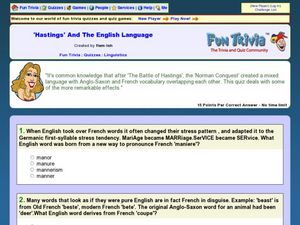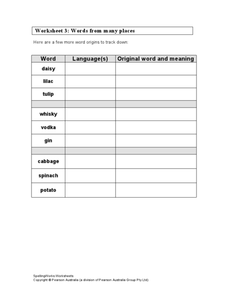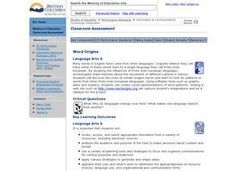Curated OER
Origins: a Simple Word Game (for Use in Human Relations Trainings)
Tenth graders acquire the knowledge, attitude, interpersonal skills to help them understand and respect self and others. They participate in "Origins" as either group participants or judges. For each round, they give the common usage and...
Curated OER
Mythological Word Origins
No wonder the ship was called the Titanic. An investigation of Norse, Roman, and Greek Mythology provides insight into mythological characters and corresponding words in the English language. A close look at roots, prefixes, and suffixes...
Curated OER
Animated Alphabet
Students explore English by completing an interactive language history activity. In this word recognition lesson, students discuss word formations and the phonetic relationship between letters. Students identify the origin of individual...
Ohio Department of Education
Word Origins
Understanding a word's etymology can really help with decoding and building vocabulary skills. Readers compare and contrast words of similar origins but with different difficulty levels. They focus on prefixes, suffixes, and affixes....
Curated OER
'Hastings' and the English Language
Follow the development of the English language from its Anglo-Saxon roots. Various Germanic, Roman, and French words helped form our English vocabulary and are incorporated into this quiz. See how well you know the beginnings of English...
Curated OER
Spanish in English
What do the words alligator, armadillo, and cockroach all have in common? Each one is an English word with Spanish origins. Introduce young etymologists to the joys of discovering word origins with a lesson that asks them to create a...
Curated OER
Etymology
Students tie together planet names with Greek mythology. Students browse thru a dictionary to see where exactly these names came from and what significance they have. Students explore the origins of some English words.
Curated OER
Where Do Words Come From?
Students examine the foreign-language roots of various English words. Using the dictionary's word derivation notes and abbreviation key, they develop a list of words with a foreign-language origin, and create a class dictionary.
Curated OER
What's in a Word?
Students complete a unit on words, their origins, and their usage. They explore various websites, create a word ladder online, develop a list of anagrams, write a story using homonyms, and create a list of vocabulary words.
Curated OER
Word Origins
Have you ever studied historical words and found that they were deeply rooted in racism or prejudice? Select a long list of these words to have your class examine. What familiar roots do they have? Do they know when this word originally...
Curated OER
Word Origins
Discuss where some words originated, how they are used today, and new words recently added to the dictionary. This short slide show is lacking in depth but could possibly work as a review.
Curated OER
Words from Many Places
In this word origins worksheet, students write the language and original word and meaning for the words given. Students do this for 9 words total.
Curated OER
Become a Word Detective
Students investigate the origin of words in the English language. In this language history lesson, students examine words by breaking them down and finding their roots. Students analyze words from a poem and complete a word detective...
Curated OER
Once Upon a Word
Young scholars explore the derivations and usage of common slang terms. Through internet research and discussion, students consider the Latin and Greek roots of contemporary slang terms. Groups complete an etymology chart documenting...
Curated OER
Words with Less Common Derivatives
In this derivatives instructional activity, students review the definition of derivatives and then some examples. Students then find a derivative on their own for the word oppose and complete activities for its derivative. Students then...
Curated OER
Language Arts- Word Origins
Sixth graders locate, access, and select appropriate information from a variety of resources, including electronic sources. They analyze the audience and purpose of the task to make decisions about content and format.

















